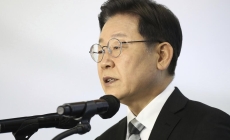-
Immigration Agents Conduct More Raids in LA, Clashing Again With Protesters - 1 day ago
-
A Professor Was Fired for Her Politics. Is That the Future of Academia? - June 6, 2025
-
Big changes coming to Disneyland: ‘Monsters’ is out; ‘Avatar’ is in - June 6, 2025
-
In War-Torn Nations, Trump’s Travel Ban Brings a New Hardship - June 5, 2025
-
As Trump Says He’s Stamping Out Antisemitism, He Advances Similar Tropes - June 3, 2025
-
How a former factory worker rose to South Korea’s presidency - June 3, 2025
-
$105 Million Reparations Package for Tulsa Race Massacre Unveiled by Mayor - June 1, 2025
-
Israel Bars Arab Foreign Ministers From High-Level West Bank Visit - May 31, 2025
-
Central California carjacking was an insurance scam, investigators say - May 31, 2025
-
U.S. Pauses Exports of Airplane and Semiconductor Technology to China - May 29, 2025
Former U.S. Agriculture Official Says Menendez Told Him to ‘Stop Interfering’
In May 2019, a top official in the U.S. Department of Agriculture got a call on his cellphone from Senator Robert Menendez of New Jersey.
The conversation was brief, the senator was curt, and the message was clear: “Stop interfering with my constituent.”
Ted A. McKinney, then the under secretary for trade and foreign agricultural affairs, testified about the exchange on Friday during the third week of Mr. Menendez’s bribery trial in Federal District Court in Manhattan.
It was the first time that jurors had heard directly from a witness who attributed conduct to the senator that is central to the government’s claim in an indictment that alleges a sprawling bribery conspiracy: that Mr. Menendez was willing to flex his political muscle to win favorable treatment for allies.
At the time of the call, Mr. McKinney and others at the U.S.D.A. had been publicly sounding the alarm about a deal Egypt had brokered that granted a halal meat monopoly to a New Jersey startup run by Wael Hana, a longtime friend of the senator’s wife, Nadine Menendez.
Until then, four companies had divided the work of certifying that halal meat exported from the United States to Egypt had been prepared according to Islamic law. The sudden change was causing the price of halal products to climb in Egypt and risked the loss of business for U.S. ranchers, farmers and beef processors, Mr. McKinney said.
As he testified, Mr. McKinney was unambivalent about what he saw as the purpose of the call by Mr. Menendez, then the ranking Democrat on the Senate Foreign Relations Committee.
“I felt he was telling me to stand down,” Mr. McKinney said, “and stop doing all of the things that we were doing.”
According to the indictment, the company that won the monopoly, IS EG Halal, was used to funnel bribes to Mr. Menendez and his wife.
Mr. Hana, a U.S. citizen who emigrated from Egypt as a young adult, maintained close ties to Egyptian intelligence officials, according to trial testimony. As the halal meat monopoly was being negotiated, prosecutors say, Mr. Hana and Ms. Menendez arranged meetings between the senator and top Egyptian military officials; they also relayed messages about the country’s desire for increased U.S. aid.
The United States had no power to block Egypt’s decision to give the work to IS EG Halal. And on cross-examination, Mr. Menendez’s lawyer, Adam Fee, stressed that fact.
He pressed Mr. McKinney about whether he was aware that Egypt had concerns that meat shipped from the United States was not being prepared according to Islamic custom before it shifted to a sole certifier, suggesting an alternative explanation for the lucrative monopoly.
Mr. McKinney said his main concern was that giving all the work to IS EG Halal, which had no prior experience in the industry, could cause delays in certification while increasing costs for farmers and U.S. beef processors. This, in turn, might limit U.S. companies’ ability to market their products overseas.
“I wanted to make sure that we had competition,” Mr. McKinney said.
Mr. Fee was to resume his cross-examination of Mr. McKinney on Monday. Mr. Menendez, in a brief comment to reporters outside the courthouse, said, “You wait for the cross and you’ll find the truth.”
Mr. Hana and a second New Jersey businessman, Fred Daibes, are charged with the senator and his wife in the bribery conspiracy. Mr. Hana and Mr. Daibes are on trial with Mr. Menendez, but the judge, Sidney H. Stein, delayed Ms. Menendez’s trial because she is being treated for breast cancer. All four have pleaded not guilty.
Mr. Menendez’s lawyers have challenged the government’s version of what transpired in the conversation. “There was no pressure applied on the call,” Avi Weitzman, another of the lawyers, told the jury in his opening statement.
Mr. Menendez had previously “reached out to federal agencies on multiple occasions in order to help constituents,” Mr. Weitzman added. “That’s his job.”
In describing the call from the senator, Mr. McKinney testified that Mr. Menendez had begun by mentioning an article, published in Arabic, that had laid out the history of Egypt’s newly streamlined certification process. Mr. McKinney said that when he had attempted to explain his concerns to the senator, he was abruptly cut off.
“He said, ‘Let’s not bother with that,’ or ‘That’s not important,’ or ‘Let’s not go there,’” Mr. McKinney said, acknowledging that he did not have an exact memory of the conversation from five years ago. “But he stopped my explanation.”
Soon after the call, Mr. Menendez’s Senate office forwarded the article and an English translation, and Mr. McKinney said he had begun preparing a written response.
He then acknowledged that he had become aware that the Federal Bureau of Investigation was looking into the business arrangement, and he told his staff members not to send the prepared material.
“I put the word out,” he testified, “to please stand down.”
“It was in the hands of the F.B.I.,” he added.







